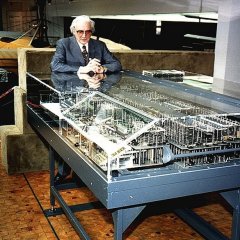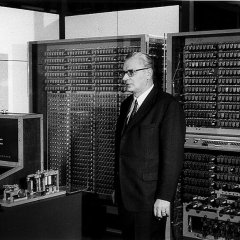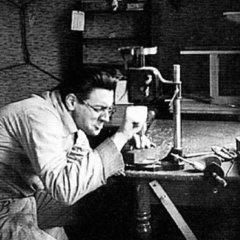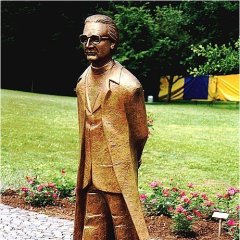Konrad Zuse
Honorary citizen and father of the computer

Prof. Dr. h. c. Konrad Zuse had to fight for his international recognition for a long time. In the middle of the war, in 1941 in Berlin, he introduced his first running freely programmable computer to a small circle of scientists and engineers, which already worked with binary floating point calculus, a principle that is the basis of every modern computer.
Today, even American and English scientists acknowledge that it was Konrad Zuse who built the first computer. The computer pioneer spent most of his creative life from 1956 until his death in 1995 in Hünfeld.
The city granted him honorary citizenship in 1976, and since 2006 Hünfeld has officially been called "Konrad-Zuse-Stadt" by a decree of the then Hessian Minister of the Interior Volker Bouffier.
Even after his retirement from the company in 1965, he continued to work as a scholar and was able to devote himself even more to his great passion, painting. Until the end, Zuse was creative and in 1992 he obtained a patent for the helixturm he designed. This tower is a height-variable support structure for wind turbines, for example, in order to increase their efficiency. In 1995, the inventor and visionary died in Hünfeld.
The Konrad-Zuse-Platz, Konrad-Zuse-Straße, Konrad-Zuse-Schule and Konrad-Zuse-Museum Hünfeld is also dedicated to his life's work with the history of the town and district. This museum has the largest collection of Zuse devices in the world and many exhibits that allow visitors to meet Zuse as an engineer, scientist and artist, who left a total of 1400 paintings, woodcuts and drawings. In addition, Zuse also worked as an advertising graphic designer in the 1920s, among others, for the Ford plants in Germany.
Zuse not only created the world's first program-controlled calculator using binary floating point calculus, he also wrote the first universal programming language, "Plankalkül", in 1946 and founded the world's first commercial computer company in 1949 in Neukirchen near Hünfeld. His devices revolutionized research and teaching at German universities and significantly influenced the industrial development of Germany in the post-war period. His theories on computational rheum and self-replicating systems, which he published in the 1960s, still deal with physics, astronomy and business in the context of Industry 4. 0.





